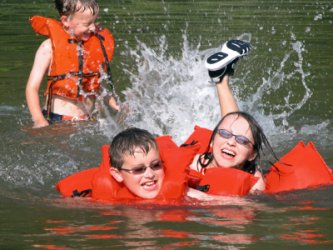Summer camps are a wonderful option for parents looking for ways to keep their kids busy while having fun. They can offer great opportunities for your child to socialize, learn new skills, expand their horizons, grow as individuals, and, of course, make new friends.
How does a parent select the right camp for their child? Here are some tips to help you zero in on the perfect camp...
By Karen Sibal
 My 9 year-old daughter recently informed me that summer was fast approaching, as if I wasn’t aware of the change of seasons around me. Rather than asking me what we had planned for this summer, she informed me that plans were underway with her “summer friends” as she calls them – a group of girls she sees exclusively at camp when school’s out. For the last two years, they’ve attended the same day camps and have had a blast. Summer has become a treasured time for them to build on their friendships while trying their hand at a new activity each year.
My 9 year-old daughter recently informed me that summer was fast approaching, as if I wasn’t aware of the change of seasons around me. Rather than asking me what we had planned for this summer, she informed me that plans were underway with her “summer friends” as she calls them – a group of girls she sees exclusively at camp when school’s out. For the last two years, they’ve attended the same day camps and have had a blast. Summer has become a treasured time for them to build on their friendships while trying their hand at a new activity each year.I still recall the first time I began contemplating summer camp for my kids and being swamped with the choices out there. As another school year now comes to an end, I’m sure many parents are facing the annual challenge of having to plan a summer full of exciting activities for their kids. With both parents working these days, even vacation time that parents typically take becomes stretched to the limit, with many long summer days still left before school re-opens. Summer camps are a wonderful option for parents looking for ways to keep their kids busy while having fun. They can offer great opportunities for your child to socialize, learn new skills, expand their horizons, grow as individuals, and, of course, make new friends.
How does a parent select the right camp for their child? Read on for some tips to help you zero in on the perfect camp.
Start with Determining the Type of Camp
There are so many different kinds of camps out there! Here’s a good summary of what’s available:
- “Traditional” camps that offer a little bit of everything – this could be swimming, soccer, hiking, arts and crafts and more.
- Academic camps that focus on science, math, or even creative writing. These camps are an excellent way to give your child some extra help in an area he may be weak in during the school year, or you may want to give your child a head start by preparing for the upcoming school year.
- Adventure camps that are all about outdoor hobbies like rafting, mountaineering, rock climbing with outdoor climbing ropes or horse-back riding
- Performing arts camps that specialize in theatre, music, film, dancing, languages or painting
- Religious camps that focus on faith and worship
- Sports camps that let you sharpen your skills in tennis, soccer, or baseball
- Special needs camps that are tailored for kids living with an illness, such as cancer or diabetes, or a physical disability
Most of these camps are day camps – that is, camps that your child attends during the day and is home by dinner. These camps are perfect for children as young as 5 right up to teenagers and tend to run for a short duration – usually by the week – and therefore offer your child the opportunity to explore different interests. And the bonus: if your child doesn’t like the camp for whatever reasons – maybe it’s too competitive or boring, or the environment just isn’t right – you know the camp will end soon. There are also overnight camps which become suitable for children as they reach 9 or 10. While an overnight camp isn’t for everyone, it offers your child the opportunity to pick up really valuable social and life skills and chances to take on new responsibilities. But you are the best judge of whether your child will be able to adapt to an overnight camp. Some kids may experience separation anxiety and homesickness – yet most children seem to adapt in a matter of a few days given that there are many camp directors skilled in the delicate art of wiping away the tears of first-time overnight campers. In fact, many kids really love the idea that every night is like a sleepover party with friends!
Choosing the Right Camp
Every camp is unique in its own way and the choices out there can be overwhelming for families. As a parent, you know your child best – their hobbies, interests and comfort level with trying new things. The National Camp Association (NCA) suggests you start by answering some specific questions in your quest to finding the right camp:
1. What do you and your child want to gain from the camp experience? Consider the primary goal, which can range from learning new skills or becoming proficient in a particular subject to developing more self-confidence and exerting more independence.
2. What are other expectations of the camp experience? Determine whether your child is old enough to try an overnight camp, or if a day camp is more appropriate right now. Other small, but possibly important details: Does the camp have a pool or a lake (or both)? For overnight camps, are the campers sleeping in cabins or dorm-like buildings? Do day campers take field trips or stay onsite?
3. What are the special interests that your child wants to explore? Remember, there are many choices. Make sure your child gets to try new things!
4. Does your child have any physical, intellectual, or social limitations? If there’s a question about whether a camp can accommodate her, contact the camp director to discuss your child’s needs.
5. What kind of emphasis will your child profit from the most? Think about how the camp structures the day, what its professed values are, and whether you’d prefer a coed camp or not.
Parents also need to keep in mind that the summer camp experience is about their child – and not them. It’s important you don’t force your child to attend a camp that really interests you. You may love art, but your kid may have no interest in becoming the next Picasso. And, if your child isn’t very athletic, don’t subject her to a week of soccer camp just because you’d like her to become more active. Chances are she’ll have a miserable experience and may resist trying camps in the future. By being mindful of your child’s interests and limitations, you have better odds of your child having a fun and memorable camp experience. Also, consider selecting a camp with varied activities. Your child may think hockey camp sounds great, but may get tired or bored with it. With other activities available, she has the option of trying something else. The key to choosing the right camp lies in knowing your child’s interests, preferences and personality and opting for camps that offer a wide range of experiences.
Other Considerations
The Better Business Bureau offers some additional questions for parents to consider:
- Where is the camp located?
- How much does the camp cost?
- What is the refund or cancellation policy? This is especially important if your child doesn’t like the camp.
- How long does each session run?
- Are half-day camps offered for younger children?
- What age groups are represented and in what percentage?
- Is the program coed? If so, what’s the approximate ratio of boys to girls?
- Who is the camp director and what is his or her background? How is the staff trained?
- What is the ratio of campers to staff members?
- Are medical facilities readily available? Is there a nurse or doctor on staff?
- If it is an overnight camp, what kind of living/eating/recreational facilities does the program offer? And what is the daily schedule like? Is there enough free time or too much?
- What are the safety regulations? What kind of supervision is provided?
- Are there rules of conduct? How is inappropriate behavior handled?
- Are visitors allowed? What kind of communication is allowed? For example, phone calls, mail, e-mail, personal visits, etc. If your child has not been away from home before, ask how the staff handles homesickness.
Some summer camps are set-up with groups that meet regularly and may even have their own facilities. If other camps are being considered check and see if they are certified by the American Camp Association because accredited camps must meet up to 300 nationally recognized standards.
As part of your research, search the Internet for camps in your area. Also, don’t forget to ask around. Parents in your neighborhood are a great source of information and will gladly recommend camps. Or, your child may tell you about a cool camp that one of her friends went to last year. Word of mouth can definitely be the way to go in finding the right camp.
So, while camp can be the ideal child care solution for your kids this summer, it should be a fun, carefree and memorable experience for your child and one that you are comfortable with as a parent. The summer months provide an exciting time for kids to develop new interests, explore their environments, work on refining special skills, make new friends or build on existing friendships. For an easy, online camp-finder, visit Kidscamps.com’s Camp Quest or try the American Camp Association’s searchable database. Both sites, in addition to the NCA, are excellent resources for more information.
References:
1. Summer Camp Selector: Choosing the Right Summer Camp for Your Kids by Kelby Carr, http://familytravel.suite101.com/article.cfm/summer_camp_selector
Biography
Karen Sibal is a freelance writer, researcher and communications consultant. She is the owner of Sibal Writing and Consulting, a firm that specializes in public policy research, effective communications and web solutions for all types of organizations. Over the past 16 years, Karen has done work for local and provincial governments and several not-for-profit organizations. She is pursuing a Master’s degree in Public Policy and Administration in September 2006.
Karen has written extensively on children’s issues and has helped with launching an association for mothers and children in her community. She is a member of the Halton-Peel Communications Association and a board director with the Halton Multicultural Council. She has also served as the managing editor of a government child welfare journal.
Karen lives with her husband and two girls, ages 3 and 9 years, in Oakville, Ontario Canada. For more information about Karen, please visit her web site at www.sibal.ca
No part of this article may be copied or reproduced in any form without the express permission of More4Kids ©











Add Comment